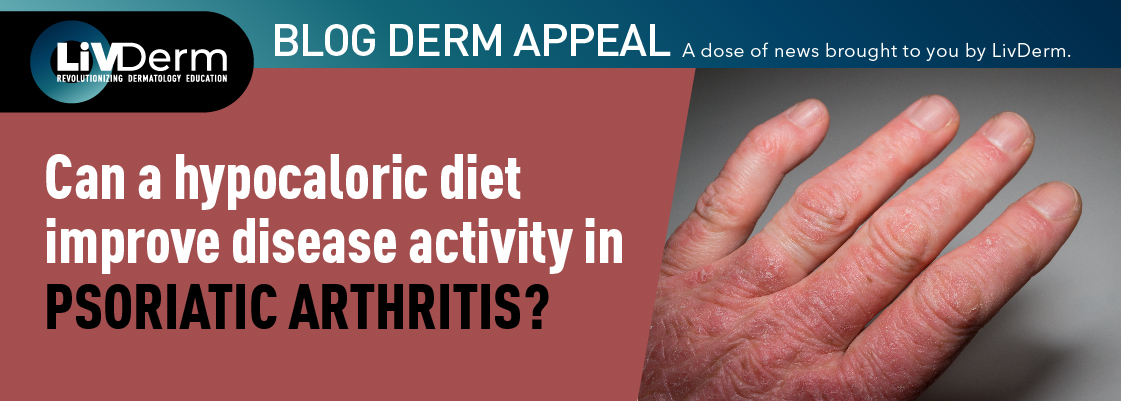Building on the previously demonstrated role of immunomodulation in chronic disease, researchers at the Federal University of São Paulo evaluated a 12-week hypocaloric diet and omega-3 fatty acid supplementation on disease activity in psoriatic arthritis. The study, conducted across three Brazilian hospitals, assessed whether dietary changes, antioxidant supplementation, or moderate weight loss improved disease activity in the skin or joints of 97 patients with PsA.
Background
Psoriatic arthritis (PsA) is an incompletely understood disease that affects up to one-third of people with psoriasis. Although they are distinct conditions, the pathogenesis in both psoriasis and PsA is attributed to an autoimmune response that attacks healthy cells of the skin and joints, causing the characteristic inflammation, swelling, and pain of psoriatic disease. Because roughly 40% of people with psoriasis and 30% of people with PsA also have obesity; a possible link has been investigated between PsA’s characteristic inflammation and the presence of inflammatory biomarkers such as C-reactive protein, sulfhydryl, and hydroperoxide that are often found in people with obesity. Because of this observed connection, there has been interest in the role of weight-loss approaches to improve disease outcomes in patients with PsA.
Although there is no data examining the effect of omega-3 fatty acid supplementation on PsA disease activity, there is data suggesting that omega-3s improve dyslipidemia, hypertension, insulin resistance, and nonalcoholic fatty liver, and reduce waist circumference, body weight, obesity, and pain. This evidence, combined with the absence of data on omega-3s in PsA, presents an opportunity to examine the the role of dietary approaches that include omega-3 fatty acid supplementation on disease activity in patients with PsA.
The DIETA trial
Based on existing observational data connecting body weight with PsA disease, a group of researchers led by Beatriz F. Leite from the Federal University of São Paulo set out to determine if PsA symptom severity had more to do with diet quality or body composition. In “Dietetic intervention in psoriatic arthritis: the DIETA trial,” published investigators were particularly interested in elucidating whether the addition of omega-3 supplementation to diet would improve disease activity or inflammatory parameters, independent relevant body composition changes.
A total of 97 patients with PsA were recruited from Sao Paulo’s Hospital (Sao Paulo, Brazil) and other rheumatology facilities in Sao Paulo (Heliopolis Hospital and Public State Hospital) from September 2012 to May 2014 to participate in this 12-week randomized trial. Participants were blindly assigned to either the diet-placebo group (hypocaloric diet and daily placebo supplement), diet-fish group (hypocaloric diet and 3g omega-3 daily supplement) or a control group. The trial subjects were evaluated for body composition and PsA disease activity at baseline and after the 12-week trial period to determine if the interventions examined resulted in statistically significant changes.
Results
The authors commented that the DIETA trial’s “12-week supervised nutritional intervention, including a 500-cal restriction, dietetic counseling and omega-3 supplementation, was effective in improving the disease activity and modifying the body composition measurements of patients with PsA. It is worth emphasizing that a hypocaloric diet plus omega-3 supplementation was more effective than a hypocaloric diet alone in promoting weight loss and fat mass and waist circumference reduction but had no extra beneficial effects on disease activity. In addition, data suggested that increased energy intake and worse diet quality may negatively affect joint activity and reduce the likelihood of achieving disease remission, regardless of weight loss or body composition changes. Although all three study groups had significant weight loss, only the diet-fish group had body composition changes, including body fat, fat mass index and waist circumference reduction during the follow-up time. However, no relevant lean mass changes were observed. In addition, no change in PsA, concomitant medications or physical activity was made during the 12-week intervention, reinforcing the role of diet in the context of disease improvement.”
Study limitations
Although the results of the DIETA study indicate that dietary modifications could have beneficial effects on disease severity in PsA, nonpharmacologic interventions generally have a low rate of adherence. Food intake and dietary behavior are also problematic to manipulate because they rely on self-reporting, and are tied to patients’ culture, habits, emotions, and economic status, which make it difficult to ensure long-term adherence.
Despite these limitations, the DIETA trial has important implications as the first randomized clinical trial designed to assess the effectiveness of a calorie-restricted diet plus omega-3 fatty acid supplementation on disease activity in patients with PsA. Nonpharmacologic treatment approaches such as diet modification are inexpensive, have little risk of adverse effects, and can be combined with standardized drug therapy.
Key takeaway
The findings from the DIETA trial demonstrate that losing or controlling weight through calorie restriction and omega-3 supplementation may have beneficial effects for patients with PsA.
Sources:
- https://clinicaltrials.gov/ct2/show/NCT03142503
- https://www.medscape.com/viewarticle/972197#vp_1
- https://advancesinrheumatology.biomedcentral.com/articles/10.1186/s42358-022-00243-6
- https://pubmed.ncbi.nlm.nih.gov/35387686/
- https://www.sciencedirect.com/science/article/abs/pii/S1568997212002601
- https://journals.lww.com/md-journal/Fulltext/2019/07120/Obesity_in_psoriatic_arthritis__Comparative.62.aspx
















